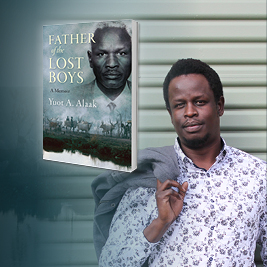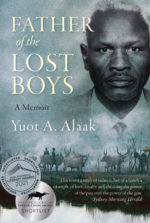Former child soldier and author Yuot A Alaak says he hopes his book will teach kids to have the courage to overcome whatever adversity they are facing, knowing that other children around the world are facing much worse

Father of the Lost Boys author and former child soldier Yuot A. Alaak says lived experiences have a lot to teach us. He says giving students the opportunity to enter the lives of refugee children in a war, but from a safe distance, can help build empathy and understanding. In this very special blog post, Yuot and is joined by his father, Mecak A. Alaak, an inspirational teacher working in the most difficult circumstances imaginable.
Yuot, your book is a very personal account of a period of great danger that you endured while you were just 12 years old. Tell us more about it.
Father of the Lost Boys tells the story of my father, Mecak Ajang Alaak, who led almost 20,000 unaccompanied minors out of danger during Africa’s longest running civil war. It is an eyewitness account by me, who once trained as a child soldier and walked by my father’s side, sometimes clutching an AK-47 as I slept next to him. Before taking on his central role with the now-famous Lost Boys of Sudan, Dad was a prominent educator imprisoned by a government that served its own propaganda interests by announcing his death over the radio. We conducted his funeral, only to discover he was still alive. Dad returned to a hero’s welcome and to one of the most challenging tasks imaginable. The story follows the Lost Boys as they journey through rainforests, savannah and desert to escape a genocidal war and devastation. I saw my father at times of immense stress, but also witnessed his determination to guide the Lost Boys towards a brighter future. Although many succumbed to starvation and thirst, drowned in treacherous rivers, or died as the result of aerial bombardments, landmine explosions, gunshot wounds and wild animal attacks, most of the Lost Boys survived. Their story is of global significance and has featured on the BBC, CNN and The Oprah Winfrey Show. But Dad’s remarkable story as leader, teacher and father of the Lost Boys has never previously been told, until now.
Mecak, you are the subject of Father of the Lost Boys and your profession was teaching. Describe what it was like to teach in the refugee camps. What were some of the challenges? What were some of the triumphs?
Students in refugee camps are some of the best students. They are so motivated, disciplined and eager to learn. They grow up so fast that it’s almost like teaching adults. Some of the challenges are logistical as there are often no books, pens and exercise books. When Yuot started school, his classroom was under a tree and they had no pens or paper so he scribbled with his fingers on sand. Seeing refugee students achieve their dreams and become teachers, nurses, writers or engineers is the biggest triumph. Seeing children believe in the pen rather than the gun is magical.
Mecak, why is education important, even during a war?
Education is very important in war because it allows you to ask the right questions. An educated person is less likely to be brainwashed and turned into a killing machine. Education will allow you to learn about how conflicts can be resolved in a non-violent manner.
And Yuot?
Perpetrators of war always want an illiterate mass that they can use to their advantage and that is why Dad faced a lot of adversity of taking the Lost Boys out of war and getting them an education.
Yuot, what did you learn as a child soldier and what did you have to unlearn when you were no longer required to fight?
As a child soldier, I learned discipline and resilience. I was taught to never give up, no matter how hard things got. I also got very fit! I had to unlearn that the gun was my mother or father, as I was led to believe. I also had to unlearn anger and learn to forgive those who had inflicted so much pain on my family and my people.
Yuot, what would you most like teachers and students to understand about how to help refugee children when they enter Australian classrooms for the first time?
Many refugee children just want to fit in. As students, the best thing you can do is just to make them feel welcome. Say hello to them, sit down with them and have lunch together. Allow them to join your social group. For teachers, the best thing you can do is to listen to them and get to know what they have been through and what they have planned in life – their fears and their ambitions. If a newly arrived refugee student who can barely speak English tells you they want to be a doctor or pilot, don’t dismiss them but support them, because many refugees have gone on to do just that.
What do you think Australian children will get out of this book – both refugees and others?
Our hope is that they better empathise with vulnerable children around the world and that they become part of the global village. We also think that this book can teach them resilience in the face of adversity. Many students deal with family break-ups, mental health issues and other hardships, so our intention is that this book teaches them to have hope and build the courage to overcome whatever adversity they are facing, knowing that other children around the world are facing much worse.
Father of the Lost Boys is available now from Fremantle Press. Free teaching notes can be downloaded here and you can listen to Yuot telling his story on the Fremantle Press Podcast.



